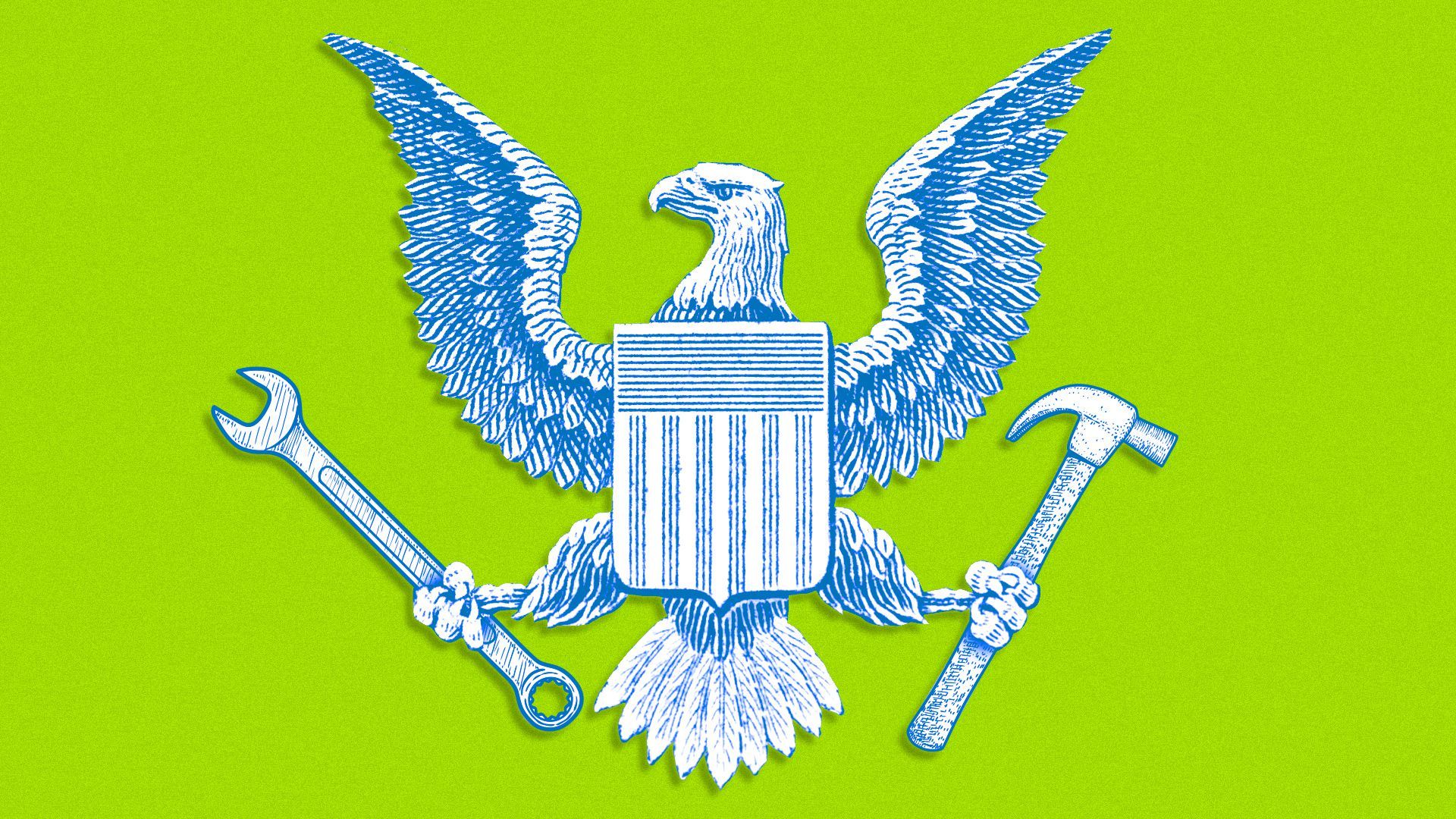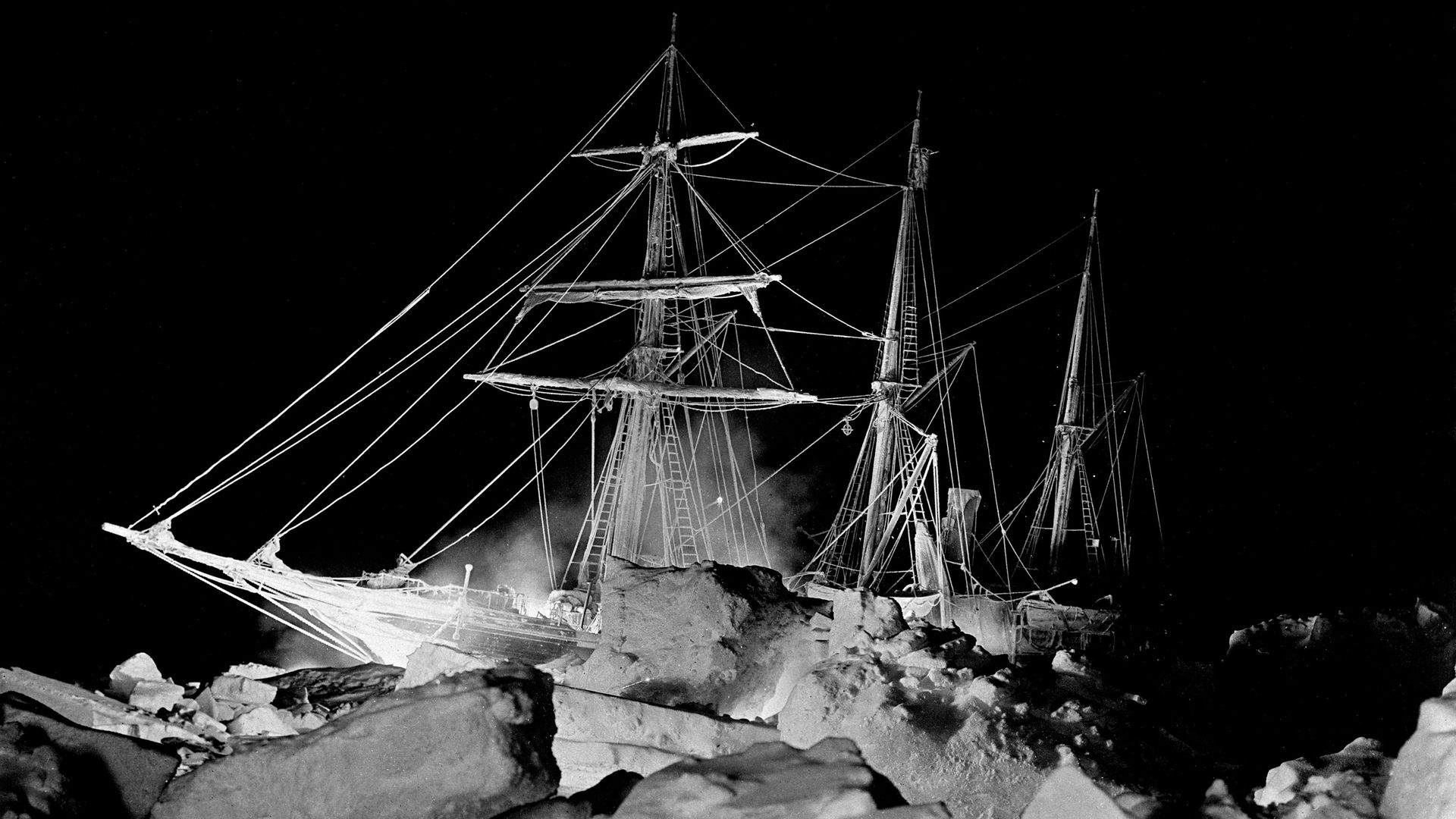| | | | | | | Presented By National Grid | | | | Axios What's Next | | By Jennifer A. Kingson and Joann Muller · Apr 22, 2022 | | Today is the 52nd Earth Day! - The first Earth Day increased environmental awareness in America, and 8 months later, in December 1970, the Environmental Protection Agency was created.
- Earth Day also led to the passage of the Clean Water and Endangered Species Acts.
- Check out some of the fastest-growing "green" jobs on LinkedIn, below.
Today's Smart Brevity count: 1,087 words ... 4 minutes. | | | | | | 1 big thing: The urgent need for "infrastructure czars" |  | | | Illustration: Aïda Amer/Axios | | | | Unless they appoint infrastructure coordinators — or czars — state and local governments risk squandering their shares of the trillions in public works money coming their way under the landmark Bipartisan Infrastructure Law, a new report from McKinsey & Co. warns. Why it matters: Because of the historic opportunity to make huge and lasting improvements, the Biden administration has urged each state to name a point person and task force to administer the law, passed in November, which targets everything from clean water and high-speed internet access to bridge and road repair and public transportation. - But so far only a handful of states, like Delaware, Arkansas and New Mexico, have done anything of the sort, Jennifer A. Kingson writes.
Driving the news: McKinsey says each state needs a centralized and highly coordinated effort to manage the massive amount of money headed its way — and to grab as much of the unassigned pie as possible. - While 60% of the funds will be allotted to states through set formulas, the rest will come through competitive grants, loans and federal programs, McKinsey says.
- Unlike the American Rescue Plan — which sought to push out aid quickly through formula-based allocations — the infrastructure law "creates a large and more complex funding environment with multiple potential applicants and detailed eligibility requirements."
Where it stands: President Biden's own infrastructure czar, Mitch Landrieu — a former mayor of New Orleans — sent letters in January to all 50 governors imploring them to name dedicated task forces that would include a chief point person. - "We know that needs, capacity, and challenges can vary widely by locality," the letter said, per CNN.
- "We need to make sure our programs reflect these realities across your state and our country, and having a senior, single point of contact in your office will help ensure that issues get elevated appropriately and rapidly."
McKinsey's report amplifies these points and emphasizes the challenges that states and large cities will face: - Unprecedented levels of funding.
- New energy technology requirements.
- Many stakeholders to coordinate, often with competing priorities.
- High labor and supply chain costs.
Share this story. |     | | | | | | 2. The employee every company needs |  Data: LinkedIn; Chart: Simran Parwani/Axios The public's growing interest in eco-safe products, along with companies' increased commitment to sustainability and efficiency, means there's a lot of work out there for environmental health and safety specialists, Joann Muller writes. Why it matters: It's "the career equivalent of a building manager's 'master key' — the unique job title that opens the hiring door at practically every company," writes George Anders, senior editor at large for LinkedIn. - Environmental health and safety specialists — whose job, generally speaking, is to help keep workplaces and their environments safe — are in high demand across all sectors, according to LinkedIn.
- The job title tops LinkedIn's list of the fastest-growing "green jobs" in the U.S.
The big picture: Demand for "green talent" is expanding across all industries — not just in what we think of as environmental sectors. - Still, traditional "green" professionals — like wind turbine technicians, solar consultants and foresters — remain in high demand too.
The catch: There aren't enough workers with the skills to fill all those jobs. |     | | | | | | 3. New suicide hotline number is unknown to most Americans |  | | | Illustration: Eniola Odetunde/Axios | | | | With just three months until "988" is launched as a shortcut to the national suicide prevention hotline, advocates are concerned that relatively few people know about it, writes Axios' Margaret Harding McGill. Why it matters: Suicide is at its highest level and still rising, with LGBTQ youth more than four times as likely to attempt suicide as their peers. Catch up quick: Phone service providers are required to route calls or text messages sent to 988 to the National Suicide Prevention Lifeline (1-800-273-8255) by July 16. Driving the news: A new poll, commissioned by The Trevor Project and shared exclusively with Axios, found that 69% of respondents had not seen, read or heard much about calling 988 to reach the Lifeline. - While nearly a third of the people polled had seen something about it, Preston Mitchum, director of advocacy and government affairs for The Trevor Project, told Axios that is not enough.
- "Since something is going live that is actually a watershed moment for LGBTQ people, everyone should know about it," Mitchum said. "Frankly, I'm disappointed that the number's just not 100%."
Keep reading. If you or someone you know may be considering suicide, contact the National Suicide Prevention Lifeline at 1-800-273-8255 (En Español: 1-888-628-9454; Deaf and Hard of Hearing: dial 711, then 1-800-273-8255) or the Crisis Text Line by texting HOME to 741741. |     | | | | | | A message from National Grid | | There is a better way to a fossil-free energy future | | |  | | | | National Grid is announcing our path to a completely fossil-free energy future. By using green hydrogen and renewable natural gas, we can achieve a fossil-free network by the year 2050. There is a better way to keep energy affordable, reliable, and clean. See how. | | | | | | 4. What we're reading |  | | | Sir Ernest Shackleton's ship, the Endurance, in Antarctica before it sank on Oct. 27, 1915, after two months of constant pressure from ice floes. Photo: PA Images via Getty Images | | | | How a Plucky Robot Found the Long-Lost Endurance Shipwreck (Wired) - "Dangling from an icebreaker in Antarctica's Weddell Sea, an underwater robot called Sabertooth dove almost 10,000 feet, painting the seafloor with blasts of sonar that betrayed the unmistakable form of a ship," Ernest Shackleton's famed Endurance, which sank in 1915. The discovery by the robot — made by Saab — is almost as good a tale as that of Shackleton's successful return to civilization.
Meet your new workday, what Microsoft calls the "triple peak" (Fast Company) - We used to divide the workday into "before lunch" and "after lunch," but increasingly "many of us are picking up a third grind between 9 and 11 p.m."
Robotic balloons could provide high-res images for numerous urban applications (Smart Cities Dive) - A Brooklyn-based startup called Near Space Labs wants to help cities use small weather balloons to collect images that could help them monitor vegetation, roadways, natural disasters and more.
|     | | | | | | 5. Pickleball, the "experience" |  | | | Rally is expected to break ground this spring. Rendering courtesy of Rally | | | | Pickleball keeps going upscale: Now in Charlotte, North Carolina, there are plans for a new "food-meets-sports" concept in early 2023, writes Ashley Mahoney of Axios Charlotte. What's happening: Rally Entertainment will launch Rally, an urban pickleball and entertainment experience, with eight pickleball courts (four indoor, four outdoor). - It will span two buildings over 1.9 acres, consisting of 27,650 square feet of indoor space.
Details: Rally will include a full-service restaurant. Its menu will be inspired by global street food and designed by an award-winning hospitality team based out of Washington, D.C. Expect premium signature cocktails, plus twists on local and international classics. - There will be two cocktail bars, private and semi-private event spaces, plus lounge and spectator seating.
Context: Barrett Worthington, a Davidson College alumnus, and Megan Charity co-founded Rally. Charity, a world-ranked professional pickleball player, will lead their pickleball program, which will include events, social leagues and tournaments. Why it matters: Pickleball is the fastest-growing sport in the nation, with 4.8 million players. - But it's not just about seeing more neighborhood courts pop up: Entrepreneurs are recognizing that pickleball is good for business.
Keep reading. |     | | | | | | A message from National Grid | | There is a better way to a fossil-free energy future | | |  | | | | National Grid is announcing our path to a completely fossil-free energy future. By using green hydrogen and renewable natural gas, we can achieve a fossil-free network by the year 2050. There is a better way to keep energy affordable, reliable, and clean. See how. | | | | Was this email forwarded to you? Get your daily dose of What's Next magic by signing up for our free newsletter here. |  | It's called Smart Brevity®. Over 200 orgs use it — in a tool called Axios HQ — to drive productivity with clearer workplace communications. | | | | | | Axios thanks our partners for supporting our newsletters. If you're interested in advertising, learn more here.
Sponsorship has no influence on editorial content. Axios, 3100 Clarendon Blvd, Suite 1300, Arlington VA 22201 | | | You received this email because you signed up for newsletters from Axios.
Change your preferences or unsubscribe here. | | | Was this email forwarded to you?
Sign up now to get Axios in your inbox. | | | | Follow Axios on social media:    | | | | | |










No comments:
Post a Comment